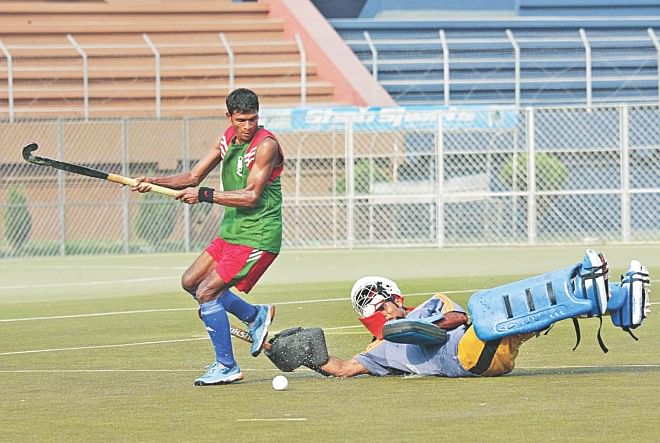A bird's eye view of our sports policy

It shall be a fundamental responsibility of the State to attain, through planned economic growth, a constant increase of productive forces and a steady improvement in the material and cultural standard of living of the people, with a view to securing to its citizens,” is stated in Constitution of the People's Republic of Bangladesh in article 15 (part II) under the provision of basic necessities.
As part of carrying out that responsibility, the Youth and Sports Ministry revised a sports policy to ensure sports activities, practice, training and participation for the citizens in 1998 after reviewing the first one which was formed on July 12, 1989.
Nearly 16 years after the formation of the policy with the advent of five sports ministers, including two of the caretaker and polls-time governments, the reality is that sports policy is still confined to the words of 26 articles of the policy book, although the policy was supposed to be reviewed every five years.
With the country gradually improving its development indicators in mortality rates, immunisation, literacy, technology, agriculture, poverty eradication and life standard, there has been a disappointing down trend in sports which has had a glorious past.
Bangladesh once had a commanding position in the South Asian region in a few disciplines such as football, athletics, shooting, swimming, etc. with the production of a number of fastest sprinters, swimmers and gold-winning shooters but it is all in the past and all sport in Bangladesh, except cricket, have gradually been losing its appeal to the people and aspiring athletes due to a lack of proper patronisation from the government and professional management.
The government has always been reluctant to appoint specialist persons at important ministries, and sp hardly has a minister with sports knowledge been appointed at the ministry of youth and sports, which can play a tremendous role in developing a nation of more than 150 million people.
The government provides tremendous financial and infrastructural support even to sporting nations like the well-off Australia, China, United States of America, Japan, Canada and Russia but here the government contributes a token financial support by which the national federations can only bear the expenses of their office staff.
Bangladesh is also far behind in approach compared to other nations. Whereas China had 35 sports institutions in which 31,000 athletes were given opportunities and 3,800 sports academies at four different levels in 1998, Bangladesh had only one sports institution of Bangladesh Krira Shikkha Protisthan (BKSP), which has eventually failed to maintain its standards.
It was evident that the sports minister, without any sporting knowledge to speak of, was more interested in renovating and construction works instead of arranging training facilities, talent hunts, ensuring financial solvency for the national federations, support for the athletes during and after their careers, professionalism in sports management and improvement of the standard of games.
If sport is considered a precondition of building up a healthy and productive nation, there is no alternative to creating sport facilities for the citizens by the government, which could really be a notable, long-term employment sector for jobless youth.
It is mentionable here that the International Olympic Committee (IOC) has confirmed that sport helps to foster positive youth development and helps to improve academic achievements and assists in the transfer of positive values and life skills that aid in employability. Young children develop their physical and cognitive capacities through play and as they move from early to mid-childhood sports help to enhance their motor ability which can ultimately lead to more active lifestyles and mitigate problems associated with sedentary behaviour and obesity.
It is also evident that the involvement in structured sporting groups also contributes to reducing gang related activity and crime committed by youth if sport programmes are properly structured and administered.
To drive the youth in the right direction as well as achieve international success from sports, Bangladesh badly need a national sports policy and strategic plan which will provide an overarching guiding policy that will define the vision, values, strategic directions and objectives for the development of sport in Bangladesh.
A sport study, conducted in Northern Ireland in 2010, showed that sport policy factors lead to international sporting success. They identified nine pillars -- financial support for sports and development, an integrated approach to policy development, participation in sports, talent identification and development, athletic career and post-career support, training facilities, coach provision and development, national competition and scientific research and innovation -- for international success.
The 1998 sports policy has almost covered everything such as establishment of the playground at each union to district level, turning all schools into breeding grounds for sports, inclusion of sport as a mandatory subject in the national curriculum, making BKSP the nucleus of all sports, priority of those disciplines which have good possibilities at international level, participation in international and regional competitions, inspiring privates companies, involvement of city corporation and pourasava in sports, formation of mid and long-term planning, incorporation of National Sports Council, Sports Directorate and BKSP under the sports ministry, etc. but it has lacked involvement of all stakeholders of the country's sports.
Apart from youth and sports ministry, sport is also related to some ministries such as finance, education, health, environment, local government, tourism, those sectors of government that employ athletes and in addition to that the National Olympic Committee, national federations and the clubs, who have mainly kept the country's sports alive.
It needs to bring all those stakeholders under an umbrella before adopting a new sport policy with a view to improving the lives of all through sport.
The author is senior sports reporter, The Daily Star

 For all latest news, follow The Daily Star's Google News channel.
For all latest news, follow The Daily Star's Google News channel. 



Comments